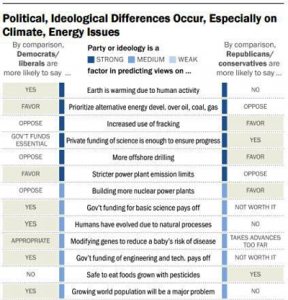By Teddy O’Hara ’17 (Westwood, MA)
On the whole, I think most individuals take the easy road and do what is most convenient, that which disrupts our day-to-day lives the least. For this reason, I am a big believer in the “top-down” approach to dealing with climate change. That is, using the highest levels of government to support sustainability while reducing our carbon footprint and impacts to our environment. We need new policies that essentially force us to live more sustainable lifestyles. To that end, I think this sort of method could work on a college campus like Colgate. Especially with our university goal to be carbon neutral by 2019, we have been fortunate enough to witness change coming from the top. Whether it be from our augmented recycling options to the further installation of motion sensing lights or low-flow shower heads, we are slowly changing the culture of a student body. With almost all climate scientists agreeing that humans are contributing to global warming, this is a problem that needs to be dealt with now, not later. From energy, to food, to water, to ecosystems, and more, climate change is affecting our lives now and will only get worse for the generations to come…if nothing is done. With that being said, I find it both interesting and necessary to examine what we are currently doing as a country and as a college to fight global warming and change the human behavior that has gotten us to this point.

As awareness for climate change has increased, as the whole idea of being “green” has proliferated, positive change has occurred. When I was in elementary school, for example, I remember opening up my lunch box to a plastic bottle of Poland Spring water. Every day! Sure, I was still having trouble tying my shoes but no one really thought twice of consuming the contents of the bottle everyday and proceeding to throw it in the trash. These days, I think most people, at least at Colgate, are aware of the environmental impacts of bottled water and often avoid purchasing them. The point is, while I have changed my behavior and noticed the change in others, I don’t think these small individual behavior changes are enough to get us to where we need to be. We need more substantial change pushed from the top. Our generation, as sustainability awareness has spread, has been better at being “green” than our predecessors, but we need policy and action that will make our country and our campus a better place.
Towards this end, President Barack Obama and Brazilian President Dilma Rousseff recently committed their respective countries to a joint agreement to address climate change. As part of the pledge, the United States has committed to increase its share of renewable energy to 20 percent by the year 2030. (This is about triple its current percentage). While steps of this nature are being taken, the “top-down” approach to dealing with climate change is often disrupted, unfortunately, at the top of our federal government. Although it is a small piece to what our nation is doing to front global warming, environmentalists were recently dealt a blow when the Supreme Court, in a 5-4 decision, struck down an ambitious environmental initiative by Obama that called for an EPA regulation to limit emissions of mercury and other pollutants from coal-fired power plants. The majority opinion revolved around the argument that the EPA had to consider costs before creating these regulations and limitations. Justice Scalia wrote: ““It is not rational, never mind ‘appropriate,’ to impose billions of dollars in economic costs in return for a few dollars in health or environmental benefits. Statutory context supports this reading.”
an ambitious environmental initiative by Obama that called for an EPA regulation to limit emissions of mercury and other pollutants from coal-fired power plants. The majority opinion revolved around the argument that the EPA had to consider costs before creating these regulations and limitations. Justice Scalia wrote: ““It is not rational, never mind ‘appropriate,’ to impose billions of dollars in economic costs in return for a few dollars in health or environmental benefits. Statutory context supports this reading.”
This, to me it seemed, was truly a microcosm of our current situation. At the top of the government, there seems to be a divide on measures like this, a divide that doesn’t fully look into the economic benefits of sustainable practices. The EPA, although not considering costs per say, noted that the benefits would far outweigh the costs of this pollutant emission. To be clear, this isn’t a political or even an economic complaint on my part. Both are drastically important to how this country functions and it has always been that way. Rather, I think this only goes to show the need for the government and the presidency to continue to push these regulations and programs through the congressional and judicial gauntlet and into practice. It is only then that widespread change will occur, then followed by behavioral change. Our country is run by politics and economics and that is completely fine. But it is these politics and economics that must be utilized to create environmental change, and utilized to ingrain sustainability within these realms. Disagreement and deliberation have always been a part of the law-making process in the United States. I do believe it is an effective and thorough system. But I also believe that climate change is a major dilemma of the 21st century and one that should transgress party lines.
In relation to Colgate, it is very promising that sustainability and our awareness for climate change is often at the forefront of the university’s decision-making process. This “top-down” approach comes in mind most recently with Chartwells’ new dining contract. The company has committed to various sustainable initiatives, including: use and support of local agriculture, reusable to-go coffee cups, solar-powered charging stations, and biodiesel processing, among many other initiatives. Furthermore, our expansion of recycling options, including electronic waste recycling, along with a new Green Buildings Standards for construction, help me to think that Colgate’s administration is doing its part to foster sustainability on campus. Having worked for the Office of Sustainability, I can certainly say that the idea of sustainability has quickly become ingrained within many different parts of Colgate’s management. Whereas the United States has to deal with many factions and obstacles to put sustainable programs, ideas, and regulations into action, it seems that Colgate is inhabited by people who have bought into these new and greener systems that continue to propagate. Thus, even though individuals can certainly make an impact, top level action in our government and at our institutions are necessary to jumpstart, facilitate, and expand sustainable behavior.


